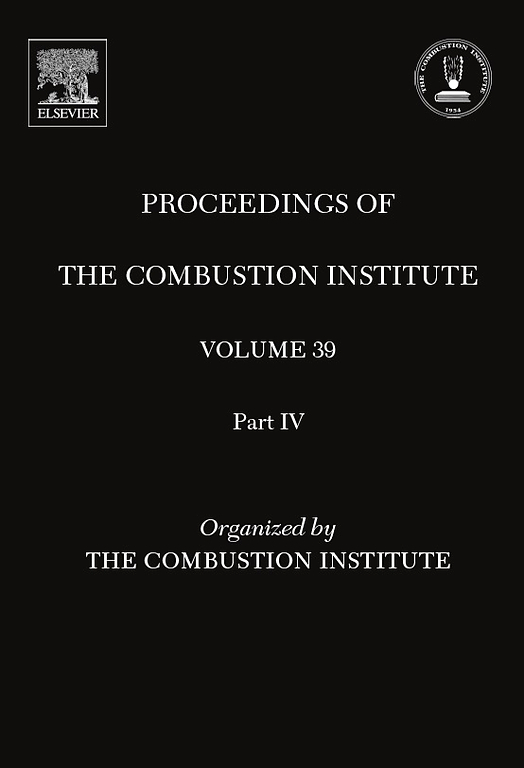Macroscopic flame and flow structures in hydrogen and methane multi-regime combustion
IF 5.2
2区 工程技术
Q2 ENERGY & FUELS
引用次数: 0
Abstract
The current experimental investigation focuses on the macroscopic structures of CH/air and H/air flames operated on the Darmstadt multi-regime burner adapted for hydrogen operation. Building upon previous research on lean-burn limits, this study utilizes simultaneous PIV and OH-PLIF measurements to examine notable differences in flame and flow structures. Six flame cases are studied, focusing on CH/air and H/air jet flames at equivalence ratios of 1.4, 2.2, and 3.5. It is observed that the hydrogen slot 2 flames exhibit unique behavior under ultra-lean conditions, demonstrating thermodiffusive effects that generate finger-like structures. Despite receiving less thermal support from the slot 2 flame, hydrogen jet flames burn faster and resist flame extinction in high-velocity regions. The extensive heat release from fuel-rich H jets maintains a stable location compared to CH jets at the same equivalence ratio, altering local flow dynamics. Additionally, the study identifies a reshaped primary inner recirculation zone (IRZ) and a secondary IRZ in H/air flame cases, which is absent in CH flames. The interplay between the jet flame and the primary IRZ results in visible flame enhancement in slot 2, indicating preheating and fuel enrichment effects. Overall, this research provides comprehensive insights into the distinct combustion behavior and flow structures of CH and H flames on a multi-regime burner.氢气和甲烷多态燃烧的宏观火焰和流动结构
目前的实验研究重点是在达姆施塔特多工况燃烧器上运行的氢气/空气和氢气/空气火焰的宏观结构,该燃烧器经调整后可用于氢气运行。在以往对贫燃极限研究的基础上,本研究利用同步 PIV 和 OH-PLIF 测量来检查火焰和流动结构的显著差异。研究了六种火焰情况,重点是当量比为 1.4、2.2 和 3.5 时的氢气/空气和氢气/空气喷射火焰。研究发现,氢气槽 2 火焰在超稀薄条件下表现出独特的行为,显示出产生指状结构的热扩散效应。尽管从槽 2 火焰得到的热支持较少,但氢气喷射火焰在高速区域燃烧得更快,并能抵御火焰熄灭。与相同当量比的氢气喷流相比,富含燃料的氢气喷流释放出大量热量,从而保持了稳定的位置,改变了局部流动动力学。此外,研究还发现在 H/air 火焰中存在一个重塑的初级内再循环区(IRZ)和一个次级内再循环区,而在 CH 火焰中则不存在。喷射火焰和一级内再循环区之间的相互作用导致槽 2 中的火焰明显增强,这表明预热和燃料富集效应。总之,这项研究全面揭示了多工况燃烧器上 CH 和 H 火焰的不同燃烧行为和流动结构。
本文章由计算机程序翻译,如有差异,请以英文原文为准。
求助全文
约1分钟内获得全文
求助全文
来源期刊

Proceedings of the Combustion Institute
工程技术-工程:化工
CiteScore
7.00
自引率
0.00%
发文量
420
审稿时长
3.0 months
期刊介绍:
The Proceedings of the Combustion Institute contains forefront contributions in fundamentals and applications of combustion science. For more than 50 years, the Combustion Institute has served as the peak international society for dissemination of scientific and technical research in the combustion field. In addition to author submissions, the Proceedings of the Combustion Institute includes the Institute''s prestigious invited strategic and topical reviews that represent indispensable resources for emergent research in the field. All papers are subjected to rigorous peer review.
Research papers and invited topical reviews; Reaction Kinetics; Soot, PAH, and other large molecules; Diagnostics; Laminar Flames; Turbulent Flames; Heterogeneous Combustion; Spray and Droplet Combustion; Detonations, Explosions & Supersonic Combustion; Fire Research; Stationary Combustion Systems; IC Engine and Gas Turbine Combustion; New Technology Concepts
The electronic version of Proceedings of the Combustion Institute contains supplemental material such as reaction mechanisms, illustrating movies, and other data.
 求助内容:
求助内容: 应助结果提醒方式:
应助结果提醒方式:


